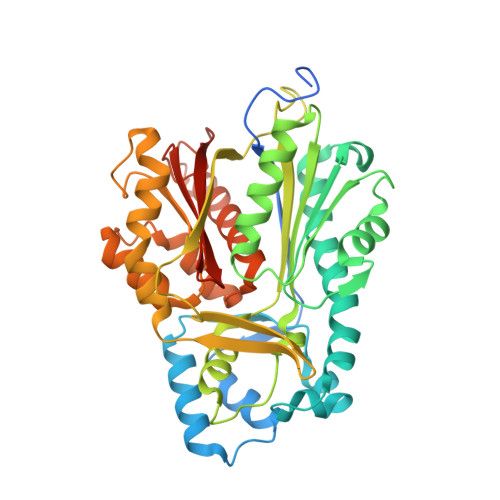Engineering a Plant Polyketide Synthase for the Biosynthesis of Methylated Flavonoids.
Peng, B., Zhang, L., He, S., Oerlemans, R., Quax, W.J., Groves, M.R., Haslinger, K.(2024) J Agric Food Chem 72: 529-539
- PubMed: 38109879
- DOI: https://doi.org/10.1021/acs.jafc.3c06785
- Primary Citation of Related Structures:
8B32, 8B35, 8B3C - PubMed Abstract:
Homoeriodictyol and hesperetin are naturally occurring O-methylated flavonoids with many health-promoting properties. They are produced in plants in low abundance and as complex mixtures of similar compounds that are difficult to separate. Synthetic biology offers the opportunity to produce various flavonoids in a targeted, bottom-up approach in engineered microbes with high product titers. However, the production of O-methylated flavonoids is currently still highly inefficient. In this study, we investigated and engineered a combination of enzymes that had previously been shown to support homoeriodictyol and hesperetin production in Escherichia coli from fed O-methylated hydroxycinnamic acids. We determined the crystal structures of the enzyme catalyzing the first committed step of the pathway, chalcone synthase from Hordeum vulgare , in three ligand-bound states. Based on these structures and a multiple sequence alignment with other chalcone synthases, we constructed mutant variants and assessed their performance in E. coli toward producing methylated flavonoids. With our best mutant variant, HvCHS (Q232P, D234 V), we were able to produce homoeriodictyol and hesperetin at 2 times and 10 times higher titers than reported previously. Our findings will facilitate further engineering of this enzyme toward higher production of methylated flavonoids.
- Chemical and Pharmaceutical Biology, Groningen Research Institute of Pharmacy, University of Groningen, Antonius Deusinglaan 1, Groningen 9713AV, The Netherlands.
Organizational Affiliation:

















